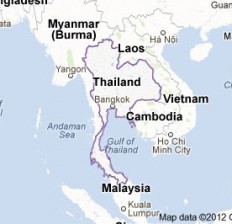BANGKOK—After nearly a decade of conflict that has left thousands dead, Thailand is considering handing over limited powers to its Muslim-majority south in an effort to persuade rebels to lay down their arms.
Thai officials will meet with the two main insurgent groups on Thursday in Kuala Lumpur for a third round of talks that have so far failed to end near-daily violence in the region bordering Malaysia.
In an effort to find a breakthrough in a war largely forgotten by the outside world, despite more than 5,500 deaths since 2004, Thai authorities have floated the idea of handing some local decision-making to three southern provinces dominated by Malay-Muslims.
“We’re not talking about autonomy but about local administration,” Bangkok’s lead negotiator Paradorn Pattanatabut, head of the National Security Council, told Agence France-Presse last week.
“They have their own identity (in the south) so local administration might be suitable to recognize that identity, culture and religion,” he said, but added that the idea would not be on the table at this week’s talks.
His comments revived an idea previously raised by the government but later shelved.
Bangkok and the tourist hotspot of Pattaya already have a form of locally-elected administration able to make bylaws, levy taxes and manage their budget.
Paradorn said elected governors there could provide a template for the culturally distinct southern provinces of Yala, Narathiwat and Pattani, whose top political rulers are appointed by Bangkok.
“It’s possible that there would be some kind of elections,” he said. “There could be governors for each province or a single governor for the three provinces.”
Paradorn raised the idea after meeting Prime Minister Yingluck Shinawatra, suggesting government backing and recognition at the highest levels of a political dimension to the violence.
Hopes of progress in the bitter standoff received a boost after rebel group PULO (Patani United Liberation Organization) joined the second round alongside the BRN (Barisan Revolusi Nasional)– held responsible for most of the violence.
Full autonomy for the south remains taboo as the constitution insists the Buddhist-majority kingdom must not be divided.
While that over-arching principle is in place, some experts doubt whether the insurgents will end their violent campaign.
“The rebels are fighting for independence, so exploration of alternative administrative models, along the lines of the Bangkok or Pattaya metropolitan areas, is not going to mollify them,” said Matthew Wheeler of the International Crisis Group (ICG).
Moreover, concerns among the Thai elite — both political and military — mean it is far from certain that Yingluck will press ahead with a potentially divisive policy.
“Many senior military officers and civilian bureaucrats are antagonistic to the idea of a special administrative zone, as is the opposition Democrat Party,” Wheeler said, adding it “seems unlikely” Yingluck would exhaust political capital on the issue.
Some in the south, where both Buddhist and Muslim civilians have borne the brunt of the conflict, see Paradorn’s proposal as a distraction from the wider issues of alleged abuses by Thai security forces and the perceived denigration of Malay Muslim culture.
“It would be useful for the people to have an (elected) representative who would understand them and know their thoughts and feelings,” said Adilan Ali-Ishak, head of the Muslim Attorney Centre in Yala province.
“But I don’t think it’s the priority of the people. They want safety… and an end to discrimination — detainees are still assaulted, still not allowed to speak the Malay language.”
At the same time there is a growing realism among some of the south’s wider population that limited local power would represent progress of sorts.
“It is very important to give power to the local people,” said Srisompob Jitpiromsri, director of conflict monitor Deep South Watch.
“Decentralization is a kind of justice… it is a political justice that gives opportunities and rights for the people to administer themselves.”
Some experts warn that the fragile peace process could collapse altogether in the absence of an impartial mediator empowered to help draw up a roadmap out of the conflict.
“This whole process is on life-support, and it’s unclear whether either side is able to generate enough goodwill to get it off life-support,” said Anthony Davis, a security analyst with IHS-Jane’s.
